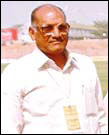Random thoughts from an ex-selector
Sujata Prakash
This is not an interview. The following is just a random collection of thoughts from an ex-selector who happens to be in the family, and who I met last week at my cousin's wedding.
Over the years, the board members have come in for a tremendous amount of flak for running Indian cricket as if it was their personal organization. They have even been accused of treating the players with a disdain and complacency reserved for lowly employees. Kishen Rungta has lived through it all -- the media attention, the mudslinging and the snide remarks that have come his way concerning the workings of the RCA -- with equanimity. His eyes still shine, as always, when talking of cricket, and he gives one the impression that nothing can faze him, not even the deadliest bouncer, verbal or otherwise.
 Perhaps this has to do with the fact that he is an ex-Ranji player with five centuries under his belt. Whatever, he ducked the uncomfortable questions neatly and instead talked of how important it was to keep Indian cricket on the right track at this crucial moment.
Perhaps this has to do with the fact that he is an ex-Ranji player with five centuries under his belt. Whatever, he ducked the uncomfortable questions neatly and instead talked of how important it was to keep Indian cricket on the right track at this crucial moment.
On Sharjah and government interference: (Strangely, unlike some current board members who think Sharjah is a haven of propriety and that the government should keep it's nose out of their business, Kishen Rungta thinks neither). A cricketer can stray anywhere, be it Sharjah or Bombay, but by avoiding Sharjah the players got that much-needed rest. No player wants to miss out on a tour, whether it's because of financial considerations, or because of the fear of being upstaged by another; so the only way to make the key players rest is to rap the board officials on the knuckles -- for in actuality some of them hanker after these all-paid holidays and use the cricketers for their own ends.
The government has taken a sensible step, by choosing to butt in and pull the reigns on the board, as long as it is subtle and doesn't take over the body and make a mess of it like it has in the other sectors it has swallowed.
On the sudden explosion of One-Day cricket and the ensuing fame for the board: Since the last 10 years the game has drawn a tremendous amount of money and attention. The glamour of it all certainly went into more than a few official heads who behaved counter productively to the game. Instead of focussing on issues which needed redressing, they spent their time on power brokering.
On the development of the game: The cricket academies are the best thing to have happened and should have been set up a long, long time ago. It's true the game was not developed and nurtured the way it should have been. The money should have been ploughed back into the game in an intelligent way, but perhaps no one knew how to go about it. Hopefully, the future will not be like the past in this respect.
On the Indian media: The Indian and English media are the worst when it comes to haranguing their team. There is far too much chastisement when a player loses form or the team does badly. The Australian media is the perfect example of slipping in cheerleaders under the guise of reporters. See how it has done wonders for their teams' morale.
On the selection process and the intricacies involved: It's easy for someone to write a column on upcoming tours and offer an opinion on team composition. But it is the selectors who travel around the country, observing the players and being aware of each of their weaknesses and strengths. Do the reporters do that? Most of them are sitting in their air-conditioned offices and deciding from there what the team component should be without the field work. As an example, before India's last tour to England, there were many 'my best 11' by noted reporters and ex-players of no mean repute. The surprising part was that only 6 players were common amongst all. None of them could agree on a team. No two 'experts' thought alike. But then, selection was never an easy job.
You can also read:
'When you think of the best answer to the Aussies, you think of Tendulkar, don't you? For us, it was as simple as that'
Sujata Prakash